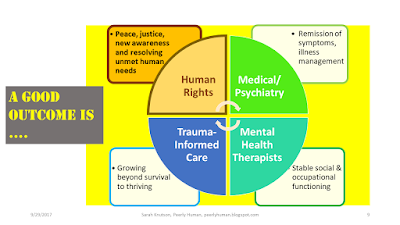 The human rights perspective defines the problem differently from common mental health approaches.
The human rights perspective defines the problem differently from common mental health approaches. 1. Disease model psychiatry
Medical model psychiatry tends to sees the problem as a 'mental illness' resulting from an individual's abnormal or malfunctioning biology. ' human thoughts and behaviors as originating from genetic, biochemical or biological diseases of the brain. People are often born with these problems or a tendency to them. Once such problems have manifested there may be little hope for change.2. Conventional 'talk' therapy
Conventional talk therapy tends to focus on the psychological aspects of human functioning, rather than biological ones. It sees problems as stemming from maladaptive thoughts, feelings and behavioral responses. Dysfunction is believed to be learned, often in one's family of origin. While sometimes deep-rooted due to early life experiences or extended counter-productive practice, practitioners with this orientation generally see psychological disorders as amenable to change with insight, effort and new learning.3. Trauma- Informed Care
Trauma-informed care sees the main problem as trauma. It notes the research demonstating the pervasiveness of violence, abuse, neglect and adverse childhood experiences in mental/ behavioral health populations. It holds that we are not seeing disorders, but rather survival responses. The severity of one's trauma determines how big of a survival response you will see (dose-response effect).
4. Human Rights
Human rights sees problems as inherent in the nature of being human. We all have the same basic needs and we all need to meet them in order to feel well, live well and be well. Whenever any one us us is unable to find a way to meet our basic needs, breakdown and sometimes conflict are predictable results.
That's all for hour #6.
The next how we will say more about the next slide below:






No comments:
Post a Comment
Please share your thoughts: